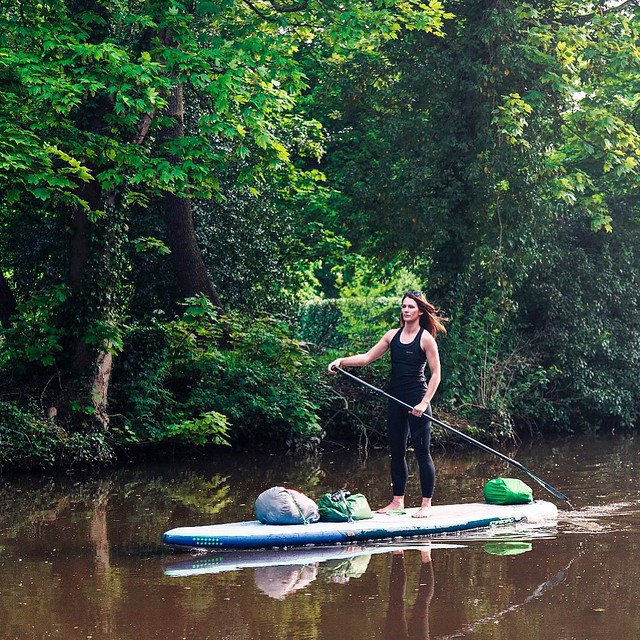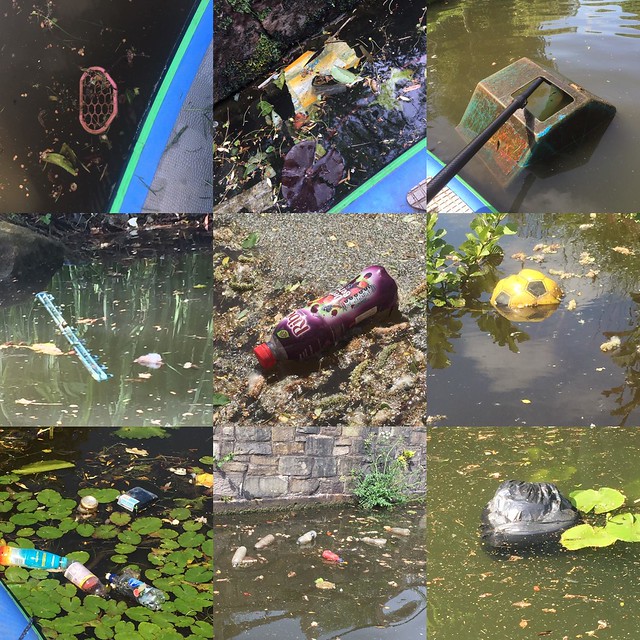http://e-info.org.tw/node/116673
英國女立槳手22天挑戰 640公里塑膠垃圾全紀錄
文字大小
249 1 Share1
本報2016年7月4日綜合外電報導,王詩婷編譯;陳瀰真審校
英國女立槳運動員麗茲卡爾(Lizzie Carr)花了22天,拍下2000多張「見證照」,詳實紀錄英國水道塞滿塑膠垃圾的情景。在這趟400英里(約640公里)的划行歷程中,30歲的卡爾總共拍到1600個以上的寶特瓶、850多張塑膠袋、40顆足球、24個玩具、七隻奶嘴、一對交通錐和一個垃圾桶蓋。
麗茲卡爾花22天滑行640公里水道。圖片來源:Lizzie Outside。
上月5日,卡爾完成22天的挑戰,划過英格蘭薩里郡戈達爾明市(Godalming)至坎布里亞郡肯德爾市(Kendal)的水道,最後的「收穫」只有一對腫脹的關節。
卡爾說,過去她在倫敦帕丁頓的運河進行立槳衝浪(stand-up paddle boarding)的經歷深深啟發了她,那時的她對旅途中遇見的大量塑膠垃圾大為震驚。「我的划槳不斷被塑膠袋或其他東西卡住….就像是說,這實在太荒謬了,在某種程度上你甚至無法在水中划行,你根本無法讓衝浪板擺脫這些塑膠垃圾。」她說。
這個經驗促使她去檢視內陸水道如何每年貢獻近80億噸的塑膠垃圾進入海洋。
「對我來說,必須做些什麼來喚起大眾的意識,讓他們體悟到我們的運河和水道中塞滿了這些東西。目前全球都相當關注海洋的相關議題,這相當重要,但我們也要注意的是海洋中80%的垃圾實際上來自於內陸。」
運河中各式各樣的廢棄物。圖片來源:Lizzie Outside。
卡爾發現農村和城市地區之間有相當大的差異。農村地區的蘭開夏郡和坎布里郡,水道相當乾淨和完美。而城市地區則是滿佈塑膠殘骸,特別是幼童玩具。
她的目標在於記錄這些垃圾,而非直接清除它們。她希望藉由記錄這些水中垃圾,能夠激勵當地人們踏出屋外、協助當地髒污熱點的清理。她表示,這一路上支持她想法的人們都非常大方和慷慨,也想做些事情改善他們水道中的塑膠垃圾。「他們的確感受到了影響,卻不知道該如何著手執行。」
「實際上,我根本沒有意識到自己已筋疲力盡,直到我停止和坐下休息。」她說:「緊握著划槳和重複的動作讓我的手和關節都腫起來了。」而途中的193個水閘是最累人的部分,卡爾必須扛起她的衝浪板和30公斤的裝備繞過它們或是其他障礙物。
Woman paddleboarding England's canals finds thousands of plastic items
Lizzie Carr catalogued vast amount of plastic junk clogging 400 miles of waterways as she paddled through during her 22-day journey
A woman who paddled 400 miles up the length of England’s waterways found them choked with thousands of plastic items, from bottles and bags to toys and dummies.
Lizzie Carr completed the 22-day challenge on Sunday with swollen knuckles and more than 2,000 photos of plastic junk she found in canals and rivers from Godalming in Surrey to Kendal in Cumbria.
The 30-year-old paddle boarder catalogued more than 1,600 plastic bottles, over 850 plastic bags, 40 footballs, 24 toys, seven dummies, a pair of traffic cones and one bin lid.
Carr said she was motivated to undertake the journey after being appalled at the amount of plastic she encountered while doing stand-up paddle boarding in Paddington basin, in London.
“I was getting plastic bags and whatever caught up in my fin ... it was just, like, this is ridiculous – you can’t even paddle along in the water without getting plastic caught to the paddle board in some way,” she said.
That experience prompted her to look into the way inland waterways contributed to the estimated 8bn tonnes of plastic dumped in the oceans each year.
“For me, it felt something needed to be done to raise awareness of the fact that our canals and rivers are choking with this stuff. There’s great attention globally on the oceans which is really important but 80% of that comes from inland sources.”
Carr found a big difference between more rural areas in Lancashire and Cumbria, which were relatively “clean and immaculate”, and cities where she found a high concentration of plastic debris, in particular plastic kids’ toys.
While her aim was not to clean up the rubbish directly but document it, she said she hoped the records would inspire local people to go out and help clean up their local hotspots.
People on the route were kind and generous, she said, and wanted to do something about the plastic dumped in their waterways. “It was something they felt affected them, but they didn’t know how to go about doing something about it.”
The physical demands of standing up and paddling for 12 hours a day in all weathers before stopping to camp and sleep caught up with her at the end.
“Physically I don’t think I realised how exhausted I was until I stopped, and sat down,” she said. “The joints in my hands, my knuckles, are really swollen, from gripping the paddle, and from the repetitive movement.”
The 193 locks on her route were the most exhausting part, with Carr having to portage – carry her board and 30kg of gear – around them and other obstacles.
Carr began paddle boarding around two years ago, after being diagnosed with cancer, which is now in remission. Her plastic expedition, which she described as “one of the best adventures I’ve had in my life”, has raised £400 so far for the charities WaterAid and WaterTrek, and was supported by the Ordnance Survey.






沒有留言:
張貼留言